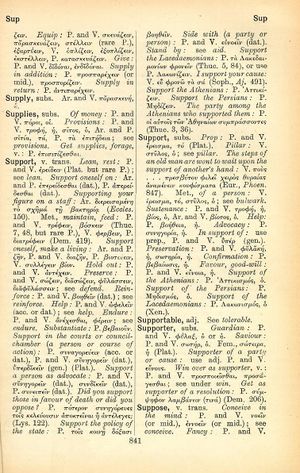suppose
ὥσπερ γὰρ ζώου τῶν ὄψεων ἀφαιρεθεισῶν ἀχρειοῦται τὸ ὅλον, οὕτως ἐξ ἱστορίας ἀναιρεθείσης τῆς ἀληθείας τὸ καταλειπόμενον αὐτῆς ἀνωφελὲς γίνεται διήγημα → for just as a living creature which has lost its eyesight is wholly incapacitated, so if history is stripped of her truth all that is left is but an idle tale | for, just as closed eyes make the rest of an animal useless, what is left from a history blind to the truth is just a pointless tale
English > Greek (Woodhouse)
verb transitive
conceive in the mind: P. and V. νοεῖν (or mid.), ἐννοεῖν (or mid.); see conceive.
assume: P. ὑπολαμβάνειν, ὑποτίθεσθαι; see assume.
suspect: P. and V. ὑποπτεύειν, ὑπονοεῖν; see suspect.
infer: P. and V. εἰκάζειν, τεκμαίρεσθαι, συμβάλλειν, τοπάζειν, V. ἐπεικάζειν.
think: (absol.), P. and V. νομίζειν, ἡγεῖσθαι, οἴεσθαι, δοξάζειν.
I suppose, perhaps: use P. and V. που (enclitic), δήπου, Ar. and P. δήπουθεν.
well suppose: use Ar. and V. καὶ δή.
ATH.
CHO.
well, suppose I have received it, what honour awaits me?
ΑΘ. δέχου δὲ σύ.
ΧΟ. καὶ δὴ δέδεγμαι. τίς δέ μοι τιμὴ μένει (Aesch., Eumenides 893; cf. also Eur., Helen 1059; Medea 386).

